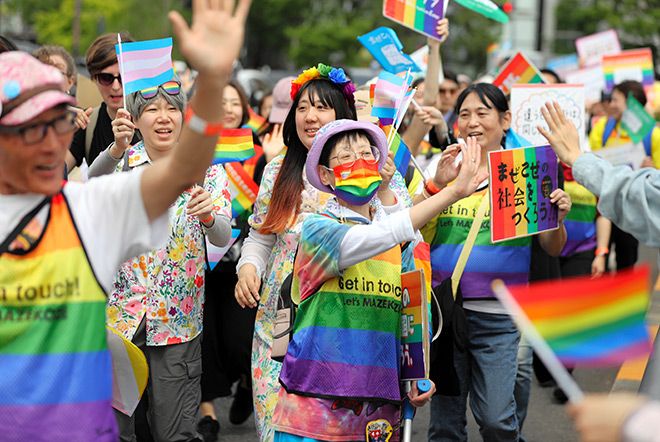
The streets of Tokyo’s Shibuya Ward were flooded with color on April 21 as 15,000 community members and supporters participated in the 30th Tokyo Rainbow Pride parade, one of Japan’s largest LGBT events.
Over the last three decades, social attitudes toward sexual minorities in Japan have changed significantly, as evidenced by a landmark Sapporo High Court ruling, which declared in March that Civil Code provisions that do not recognize same-sex marriage are unconstitutional.
Despite this progress, discrimination and prejudice against sexual minorities remain deeply entrenched. In response to these ongoing challenges, this year’s pride parade slogan was, “Don’t give up until we make change.”
Supporting sexual minorities is increasingly seen as a corporate responsibility as well.
Over the weekend, the two-day event drew a significant number of employees from corporate sponsors, wearing branded T-shirts featuring logos such as Panasonic, Mizuho and NEC.
This year, Keizai Doyukai (the Japan Association of Corporate Executives), a major business lobby, also participated in the event for the first time.
“I’m so happy that my company has recognized that I belong here,” said a lesbian in her 50s who works for a company that started sponsoring the pride parade this year.
Back in her younger days, whenever colleagues would ask, “Do you have a boyfriend?” or suggest, “Let’s go on a group date,” she felt disheartened.
Pretending to have a boyfriend was stressful and made it difficult to maintain a comfortable social life at work.
Even now, she has only come out to a very limited number of her coworkers. But perhaps with the sponsorship, the atmosphere in her office will change.
“I hope to eventually come out to more of my colleagues,” she said.
Corporate participation began to increase in the 2010s, according to Tokyo Rainbow Pride, which has organized the event of the same name since 2012.
Initially, foreign-affiliated companies were the main corporate participants. In 2014, beverage maker Cheerio Corp. became the first Japanese company to sponsor the event.
In recent years, however, participation from domestic companies has been increasing, with the number of domestic and international corporate sponsors reaching 200 in 2022, 276 in 2023 and 314 this year.
Japan remains the sole nation among the Group of Seven industrialized democracies yet to legally recognize same-sex unions.
Being seen as lacking commitment to human rights and LGBT protections can pose a risk to global corporations.
“There’s still work to be done, particularly in local areas and smaller businesses,” said Gon Matsunaka, an openly gay activist who leads “work with Pride,” an organization that evaluates companies’ LGBT inclusion efforts. “However, companies are increasingly recognizing the importance of creating and promoting work environments where sexual minorities feel safe and respected.”



